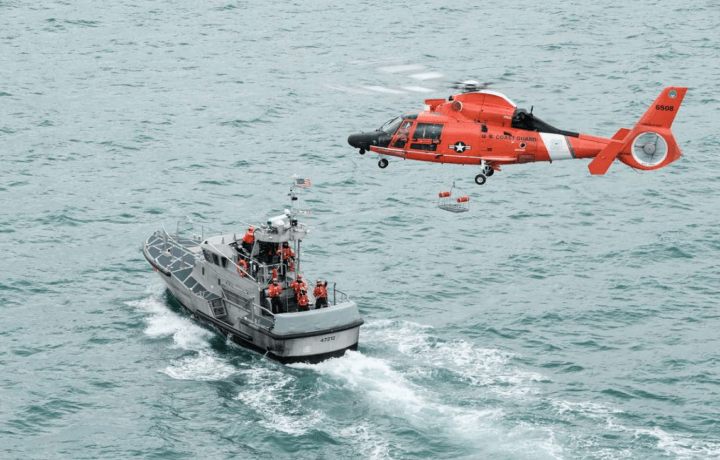The first two cyber-focused reserve commands were officially created by the United States Coast Guard (USCG) last month and will be integrated into Joint Cyber Operations and work with the U.S. Cyber Command (USCYBER). The Coast Guard Reserve Unit (CGRU) USCYBER and 1941 Cyber Protection Team (CPT) were officially established at a ceremony at Coast Guard Headquarters in Washington, D.C., and will bolster cybersecurity for the service’s networks and the Marine Transportation System (MTS).
The new cyber reserve units will offer service-wide capabilities for Coast Guardsman while allowing the service to retain cyber talent. The reserve commands will pull personnel from around the United States and will bring experience from the private and public sectors.
Based in Washington, D.C., CPTs are the USCG’s deployable units responsible for offering cybersecurity capabilities to partners in the MTS. In the past year, the USCG has established the active 1790, 2013, and 2003 CPTs as commands, while it expanded commanding officer opportunities for those seeking to follow a cyber career path. In addition, the maritime security service created the new Cyber Mission Specialist (CMS) rating for enlisted personnel.
“Coast Guard Cyber is already benefitting from its reserve members,” said Lt. Cmdr. Theodore Borny of the Office of Cyberspace Forces (CG-791), which began putting together these units in early 2023. “Formalizing reserves with cyber talent into cohesive units will give us the ability to channel a skillset that is very hard to acquire and retain.”
The Role of CGRU USCYBER
The CGRU USCYBER is beginning with 15 billets, led by Capt. Ronzelle Green. The Captain developed expertise in intelligence, maritime security, and cyber security while on active duty with the Coast Guard.
According to the USCG, Green is currently a senior executive in the Department of Defense (DoD), and in his new role, he will head a team that includes members with cyber security and resilience skills from the Department of Homeland Security (DHS) Cybersecurity & Infrastructure Security Agency (CISA), the U.S. Navy, and other government agencies and as well as corporate organization in finance, banking, and other cyber-related fields.
CGRU will primarily carry out its work at Fort Meade, Maryland, home of the U.S. Cyber Command and the National Security Agency (NSA), while it will assist in threat assessment and protecting systems and networks in addition to other U.S. Cyber Command Joint Directorates.
The U.S. Coast Guard and Cyber
Despite being one of the sixth branches of the U.S. military, the USCG is not part of the DoD. From 1967 until 2003, the Coast Guard operated under the Department of Transportation, but it is now part of DHS.
It continues to be the principal Federal agency responsible for maritime safety, security, and environmental stewardship in U.S. ports and waterways. It protects and defends more than 100,000 miles of U.S. coastlines and inland waterways, and safeguards the United States’ Exclusive Economic Zone (EEZ). It is the only branch of the U.S. military within DHS, but is also a first responder and humanitarian service to provide aid to people in distress or impacted by natural and man-made disasters whether at sea or ashore. The Coast Guard is also a member of the Intelligence Community (IC) and is a law enforcement and regulatory agency.
As part of its CTG mission, USCG is enforcing cybersecurity measures for maritime commercial traffic and infrastructure. It receives reports of cyber incidents involving any vessel, harbor, port, or waterfront facility, and will take control of vessels that present a cyber threat to U.S. maritime infrastructure.
Expanding the Cyber Mission
CGRU USCYBER will be charged with supporting the cyber mission by working alongside the active USCG.
“1941 CPT will initially augment and stand ready for recall to assist the Coast Guard’s three active duty CPTs in threat hunting, incident response and assessments to secure the MTS,” the Coast Guard announced. 1941 CPT has 39 billets and will be led by Lt. Cmdr. Nathaniel Toll, who previously served at Coast Guard Cyber, where he led the stand up of 1790 CPT, and 2013 CPTs and also led the Coast Guard’s enterprise cybersecurity operations center.
Toll, who became a cybersecurity consultant in private industry, is an example of the type of individuals the CGRU USCYBER is seeking to have within its ranks. Already, a number of 1941 CPT reserve members with cybersecurity skills formerly served in the active duty Coast Guard Cyber.
“In their civilian capacity (they) are cybersecurity professionals at DHS CISA, federal law enforcement agents, civilians and contractors in the DoD & Intelligence Community, and professionals in large technology organizations, financial institutions, and U.S. critical infrastructure operators,” USCG added.




